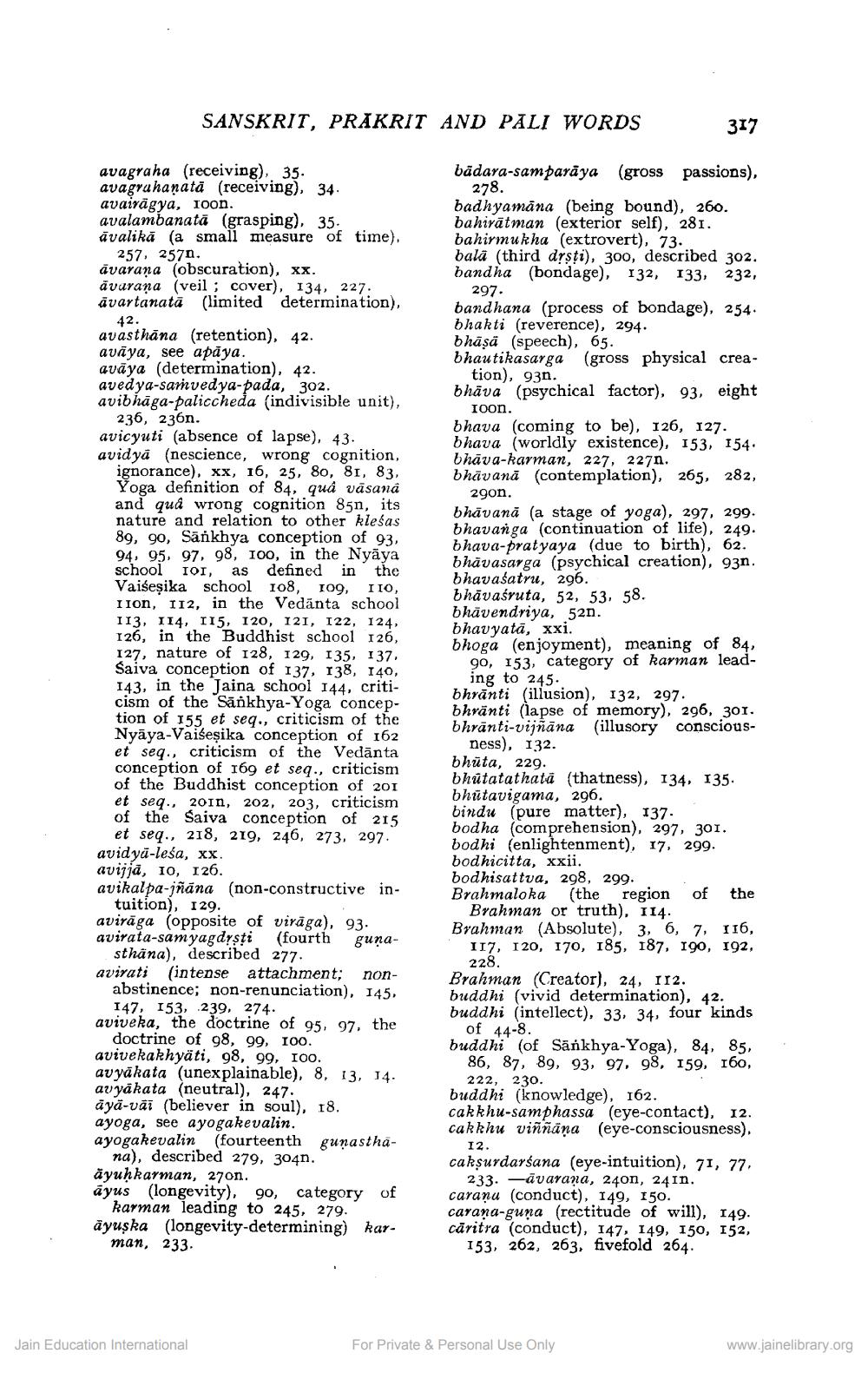________________
SANSKRIT, PRAKRIT AND PALI WORDS
317
avagraha (receiving), 35. avagrahanatā (receiving), 34. avairāgya, 1oon. avalambanatā (grasping), 35. avalikă (a small measure of time).
257, 257n. avarana (obscuration), xx. avarana (veil ; cover), 134, 227. ävartanată (limited determination),
42. avasthāna (retention), 42. avāya, see apāya. . avāya (determination), 42. aved ya-sarvedya-pada, 302. avibhāga-paliccheda (indivisible unit),
236, 236n. avicyuti (absence of lapse), 43. avidyā (nescience, wrong cognition,
ignorance), xx, 16, 25, 80, 81, 83, Yoga definition of 84, quá sasana and quå wrong cognition 85n, its nature and relation to other klesas 89, 90, Sankhya conception of 93, 94, 95, 97, 98, 100, in the Nyaya school IOT, as defined in the Vaiseșika school 108, 109, IIO, Iron, 112, in the Vedānta school 113, 114, 115, 120, 121, 122, 124, 126, in the Buddhist school 126, 127, nature of 128, 129, 135, 137. Saiva conception of 137, 138, 140, 143, in the Jaina school 144, criticism of the Sankhya-Yoga conception of 155 et seq., criticism of the Nyāya-Vaiseșika conception of 162 et seq., criticism of the Vedānta conception of 169 et seq., criticism of the Buddhist conception of 201 et seq., 2010, 202, 203, criticism of the Saiva conception of 215
et seq., 218, 219, 246, 273, 297. avidyā-leśa, xx. avijjā, 10, 126. avikalpa-jñāna (non-constructive in
tuition), 129. avirāga (opposite of virāga), 93. avirata-samyagdysti (fourth guna
sthana), described 277. avirati (intense attachment; non
abstinence; non-renunciation). 145,
147, 153, 239, 274. aviveka, the doctrine of 95, 97, the
doctrine of 98, 99, 100. avivekakhyati, 98, 99, 100. avyākata (unexplainable), 8, 13, 14. av yakata (neutral), 247. aya-vãi (believer in soul), 18. ayoga, see ayogakevalin. ayogakevalin (fourteenth gunastha
na), described 279, 304n. ayuḥkarman, 270n. ayus (longevity), 90, category of
karman leading to 245, 279. āyuska (longevity-determining) kar
man, 233
bādara-samparāya (gross passions),
278. badhyamāna (being bound), 260. bahirātman (exterior self), 281. bahirmukha (extrovert), 73. balã (third dysti), 300, described 302. bandha (bondage), 132, 133, 232,
297 bandhana (process of bondage), 254. bhakti (reverence), 294. bhāşa (speech), 65. bhau tikasarga (gross physical crea
tion), 93n. bhäva (psychical factor), 93, eight
Ioon. bhava (coming to be), 126, 127. bhava (worldly existence), 153, 154. bhāva-karman, 227, 227n. bhao amã (contemplation), 265, 282,
2gon. bhāvanā (a stage of yoga), 297, 299. bhavanga (continuation of life), 249. bhava-pratyaya (due to birth), 62. bhāvasarga (psychical creation), 93n. bhavašatru, 296. bhāvašruta, 52, 53, 58. bhāvendriya, 52n. bhavyată, xxi. bhoga (enjoyment), meaning of 84,
go, 153, category of karman lead
ing to 245. bhrānti (illusion), 132, 297. bhränti (lapse of memory), 296, 301. bhrānti-vijñāna (illusory conscious
ness), 132. bhüta, 229. bhūtatathatā (thatness), 134, 135. bhutavigama, 296. bindu (pure matter), 137. bodha (comprehension), 297, 301. bodhi (enlightenment), 17. 299. bodhicitta, xxii. bodhisattva, 298, 299. Brahmaloka (the region of the
Brahman or truth), 114. Brahman (Absolute), 3, 6, 7, 116,
117, 120, 170, 185, 187, 190, 192, Brahman (Creator), 24, 112. buddhi (vivid determination), 42. buddhi (intellect), 33, 34, four kinds
of 44-8. buddhi (of Sāńkhya-Yoga), 84, 85,
86, 87, 89, 93, 97, 98, 159,
222, 230. buddhi (knowledge), 162. cakkhu-samphassa (eye-contact), 12. cakkhu viññāna (eye-consciousness).
12. cakşurdarśana (eye-intuition), 71, 77,
233. –āvarana, 240n, 241n. caranu (conduct), 149, 150. carana-guna (rectitude of will), 149. căritra (conduct), 147, 149, 150, 152,
153, 262, 263, fivefold 264.
228.
Jain Education International
For Private & Personal Use Only
www.jainelibrary.org




